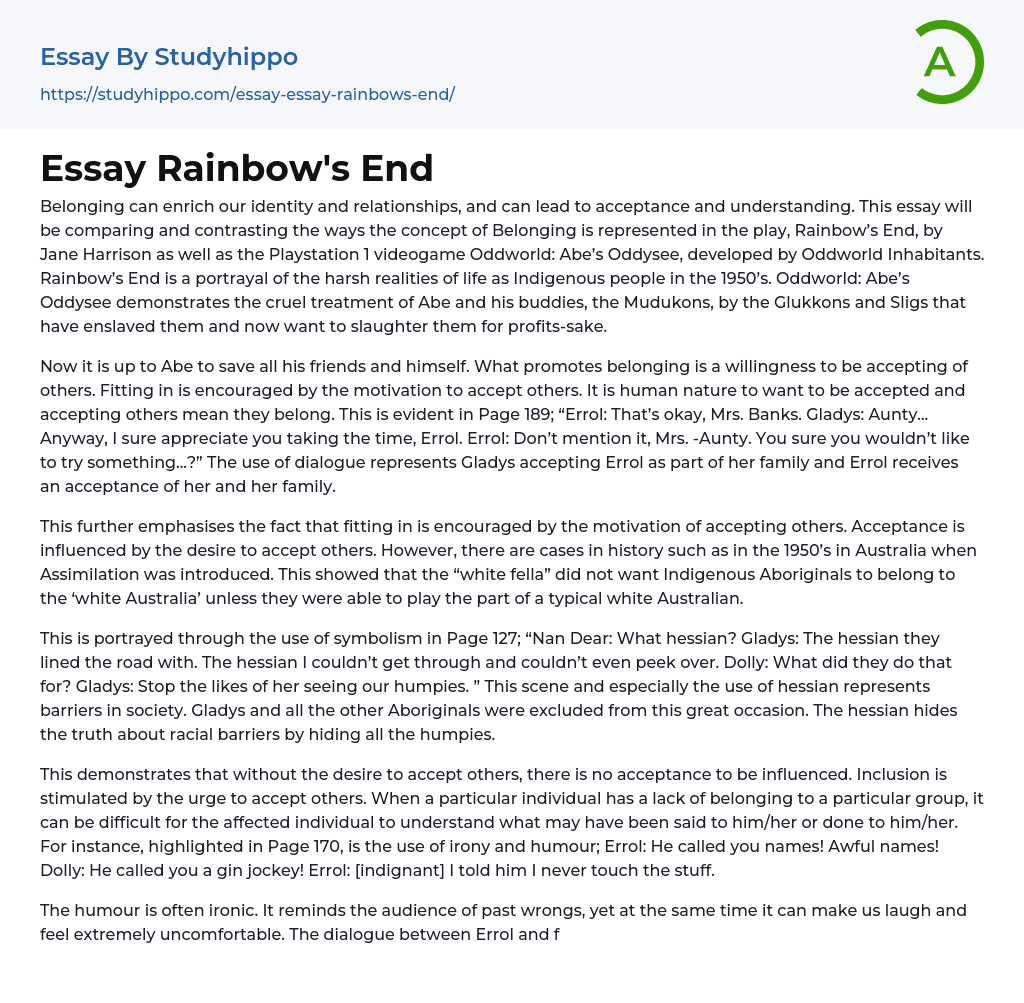Belonging can enrich our identity and relationships, and can lead to acceptance and understanding. This essay will be comparing and contrasting the ways the concept of Belonging is represented in the play, Rainbow’s End, by Jane Harrison as well as the Playstation 1 videogame Oddworld: Abe’s Oddysee, developed by Oddworld Inhabitants. Rainbow’s End is a portrayal of the harsh realities of life as Indigenous people in the 1950’s. Oddworld: Abe’s Oddysee demonstrates the cruel treatment of Abe and his buddies, the Mudukons, by the Glukkons and Sligs that have enslaved them and now want to slaughter them for profits-sake.
Now it is up to Abe to save all his friends and himself. What promotes belonging is a willingness to be accepting of others. Fitting in is encouraged by the motivation to accept othe
...rs. It is human nature to want to be accepted and accepting others mean they belong. This is evident in Page 189; “Errol: That’s okay, Mrs. Banks. Gladys: Aunty... Anyway, I sure appreciate you taking the time, Errol. Errol: Don’t mention it, Mrs. -Aunty. You sure you wouldn’t like to try something...?” The use of dialogue represents Gladys accepting Errol as part of her family and Errol receives an acceptance of her and her family.
This further emphasises the fact that fitting in is encouraged by the motivation of accepting others. Acceptance is influenced by the desire to accept others. However, there are cases in history such as in the 1950’s in Australia when Assimilation was introduced. This showed that the “white fella” did not want Indigenous Aboriginals to belong to the ‘white Australia’ unless they were able t
play the part of a typical white Australian.
This is portrayed through the use of symbolism in Page 127; “Nan Dear: What hessian? Gladys: The hessian they lined the road with. The hessian I couldn’t get through and couldn’t even peek over. Dolly: What did they do that for? Gladys: Stop the likes of her seeing our humpies. ” This scene and especially the use of hessian represents barriers in society. Gladys and all the other Aboriginals were excluded from this great occasion. The hessian hides the truth about racial barriers by hiding all the humpies.
This demonstrates that without the desire to accept others, there is no acceptance to be influenced. Inclusion is stimulated by the urge to accept others. When a particular individual has a lack of belonging to a particular group, it can be difficult for the affected individual to understand what may have been said to him/her or done to him/her. For instance, highlighted in Page 170, is the use of irony and humour; Errol: He called you names! Awful names! Dolly: He called you a gin jockey! Errol: [indignant] I told him I never touch the stuff.
The humour is often ironic. It reminds the audience of past wrongs, yet at the same time it can make us laugh and feel extremely uncomfortable. The dialogue between Errol and family members provides humorous situations and reveals Errol’s lack of cultural understanding. Subtle humour to both mimic and mock both cultures is also used. This points out that Errol has a lack of culture and consequently doesn’t belong to Aboriginal culture. Therefore, this proves that without the urge to
accept others, inclusion is non-existent.
Oddworld: Abe’s Oddysee also demonstrates the concepts of Belonging in many similar ways to Rainbow’s End but there are also the differences. In Rainbow’s End, White Australians want the Aboriginals to forget their heritage whereas in Oddworld: Abe’s Oddysee, it is far more extreme to the point where the Glukkons want to slaughter Abe and his friends, the Mudukons, like they did the Meeches and are still doing with Paramites and Scrabs. Fitting in is encouraged by the motivation to accept others. But the issue is, belonging can have negative repercussions for the individual or group.
This is emphasised in the use of an allegory seen in the Opening Cutscene of the game. It is seen when Abe explains that Meeches are now killed off and Paramites and Scrabs are still being killed for profits-sake but he also found them tasty. However, when “New ‘n’ Tasty” is revealed, he is shocked and scared out of his wits. Abe’s attitude to the situation at hand now completely changes. From being accepting of killing, he is now completely against it now that he is livestock. This demonstrates that belonging can have negative repercussions for the individual or group.
- Electronics essays
- Computer Science essays
- Consumer Electronics essays
- Enterprise Technology essays
- Hardware essays
- Robot essays
- engineering essays
- people search essays
- Modern Technology essays
- Impact of Technology essays
- Cloud Computing essays
- Operating Systems essays
- Information Technology essays
- Data Analysis essays
- Information Age essays
- Smartphone essays
- Cell Phones essays
- Camera essays
- Computer essays
- Ipod essays
- Mobile Phones essays
- 3g essays
- Bluetooth essays
- Cell Phones in School essays
- Computer File essays
- Desktop Computer essays
- Servers essays
- Data collection essays
- Graphic Design essays
- Data Mining essays
- Cryptography essays
- Internet essays
- Network Security essays
- Android essays
- Computer Security essays
- World Wide Web essays
- Website essays
- Computer Network essays
- Application Software essays
- Computer Programming essays
- Computer Software essays
- Benchmark essays
- Information Systems essays
- Email essays
- Hypertext Transfer Protocol essays
- Marshall Mcluhan essays
- Virtual Learning Environment essays
- Web Search essays
- Etiquette essays
- Mainstream essays




